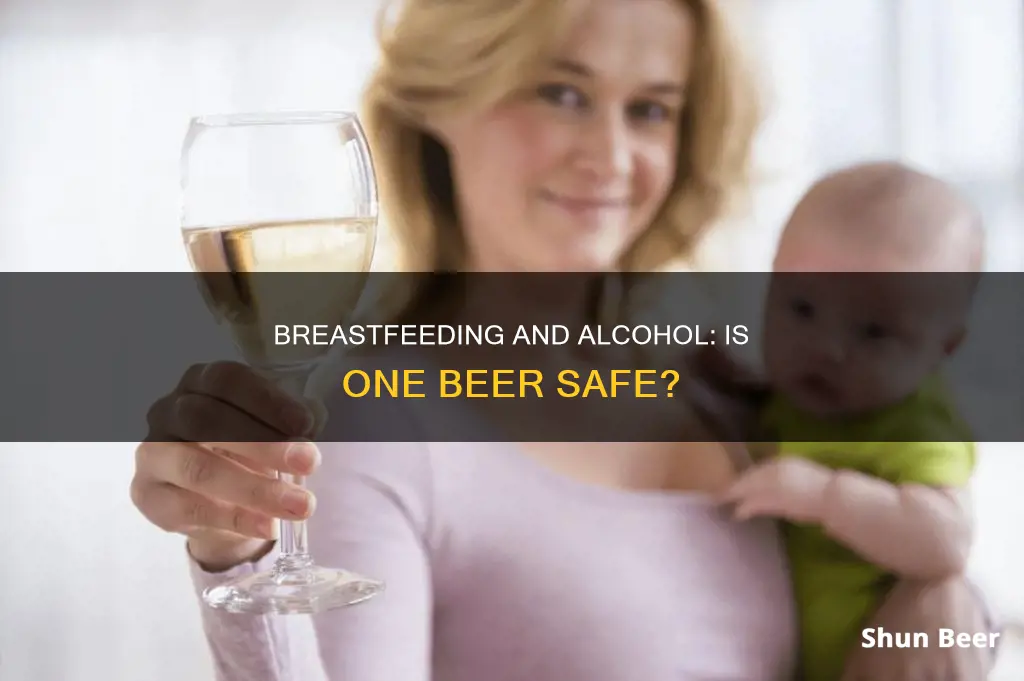
There are many conflicting opinions on whether it is safe for breastfeeding mothers to consume alcohol. While some sources suggest that drinking in moderation is safe, others recommend abstaining from alcohol completely. According to the Centers for Disease Control and Prevention (CDC), the safest option for breastfeeding mothers is to avoid alcohol consumption altogether. However, some research suggests that drinking in moderation, such as having one standard drink per day, may not have harmful effects on the infant. It is important to note that alcohol passes into breast milk and can affect the baby's sleep patterns, growth, and development. The effects of alcohol on breast milk and the potential long-term consequences for the baby are still being studied.
| Characteristics | Values |
|---|---|
| Is it safe to drink alcohol while breastfeeding? | It is safest to cut out drinking completely while breastfeeding. However, drinking in moderation (one drink a day) while breastfeeding is likely fine. |
| How long should you wait after drinking alcohol to breastfeed? | It is recommended to wait at least 2 hours after drinking one alcoholic beverage before breastfeeding. |
| Does alcohol affect breast milk production? | Alcohol may decrease breast milk production. |
| Does alcohol affect the baby's sleep? | Alcohol may disrupt the baby's sleep patterns. |
| Does alcohol affect the baby's development? | Research suggests that there may be potential long-term effects on the baby's development. |
What You'll Learn

Alcohol in breast milk: how much is transferred to the baby?
It is important to note that the safest option for breastfeeding mothers is to avoid alcohol consumption altogether. However, according to research, drinking in moderation (one standard drink per day) while breastfeeding is likely fine, although more research is needed.
The amount of alcohol transferred to the baby through breast milk depends on several factors, including the mother's weight, the amount of alcohol consumed, the speed of consumption, whether food was consumed with the drink, and how quickly the mother's body breaks down alcohol. Generally, alcohol can be detected in breast milk for about two to three hours after drinking, although this duration increases with the number of drinks consumed.
Even a small to moderate amount of alcohol may impair milk production and the milk ejection reflex, leading to decreased milk intake by the baby. Research has also shown that alcohol can affect babies' sleep patterns, causing increased REM sleep and sleep disturbances. In addition, there are concerns about potential long-term effects on the baby's development, including impaired immune function, delay of motor development, and potential impairment of cognitive development.
To minimise the amount of alcohol transferred to the baby, breastfeeding mothers can follow these guidelines:
- Breastfeed immediately before consuming an alcoholic beverage or express and store milk ahead of time.
- Limit alcohol intake to one drink per day.
- Wait at least two hours after drinking before breastfeeding or pumping again.
- Be aware that the more drinks consumed, the longer it takes for the alcohol to clear from the body.
- If the baby needs to feed before the two hours are up, use previously expressed milk or formula.
Beer and Hives: Is There a Connection?
You may want to see also

The effect of alcohol on breast milk supply
Breastfeeding mothers often receive conflicting advice about whether alcohol consumption can affect their baby. While it is generally advised not to consume alcohol during pregnancy, the risks of consuming alcohol while breastfeeding have not been as widely researched. However, studies have shown that alcohol consumption can affect both lactation and the infant.
The impact of alcohol on milk supply
It is often believed that drinking beer can help boost a breastfeeding mother's milk supply. While it is true that a component of barley in beer boosts prolactin production, a hormone necessary for milk production, the alcohol in beer decreases milk production and inhibits the milk ejection reflex, or 'let-down'. Research has shown that babies consumed 20% less breast milk during the first four hours after their mothers drank alcohol compared to when they did not.
How alcohol affects the body and the baby
Alcohol produces sedative and stimulant effects on the body. It reduces oxytocin levels and increases prolactin levels, both of which influence the milk ejection reflex. The lower the level of oxytocin, the longer the delay in milk ejection. The combination of alcohol's effect on these two hormones leads to a significant delay in milk ejection.
Moderate alcohol consumption, defined as one drink per day, is considered safe for breastfeeding mothers, with no known harmful effects on the infant. However, more than one drink per day is not recommended. Alcohol can be detected in breast milk for two to three hours after drinking, and the more alcohol consumed, the longer it takes for it to leave the body.
Pumping and dumping
Pumping and dumping will not remove alcohol from breast milk, as it leaves the breast milk as it leaves the bloodstream. However, it can be done for comfort if the mother is feeling engorged after drinking.
Other considerations
- It is recommended to breastfeed your baby before drinking alcohol, if possible, or to pump and save the milk.
- Drinking alcohol on an empty stomach increases its effects on the body and can impact sleep patterns in infants.
- Newborns cannot metabolise alcohol well, so it is best to avoid drinking alcohol until the baby is at least eight weeks old.
- Alcohol can cause drowsiness, deep sleep, weakness, and abnormal weight gain in infants.
- Alcohol can also impact the baby's immune function, delay motor development, and potentially impair cognitive development.
In conclusion, while moderate alcohol consumption (one drink per day) is generally considered safe for breastfeeding mothers, it is important to understand the potential impacts on milk supply and the infant's health. The safest option is always to avoid alcohol consumption while breastfeeding.
Understanding Beer Servings: How Much is One Drink?
You may want to see also

How long does alcohol stay in breast milk?
How long alcohol stays in breast milk depends on several factors. The amount of alcohol, how quickly it was consumed, whether it was consumed with food, the mother's weight, and individual variations in alcohol absorption and metabolism will all play a role.
According to the Centers for Disease Control and Prevention (CDC), it is ideal to refrain from drinking while breastfeeding. However, moderate alcohol consumption (up to one standard drink per day) is generally considered acceptable. The CDC and the American Academy of Pediatrics (AAP) recommend waiting to nurse for at least two hours after your last drink. This is because alcohol can typically be detected in breast milk for about two to three hours after a single drink. However, the length of time alcohol can be detected in breast milk increases with the number of drinks consumed. For example, two drinks may result in alcohol detection in breast milk for about four to five hours, while three drinks may lead to detection for about six to eight hours.
It is important to note that the type of drink also matters, as the amount of alcohol by volume varies. The higher the alcohol content, the less volume should be ingested.
Breast milk alcohol strips, which claim to measure alcohol levels in breast milk, are not recommended as they have not been sufficiently studied.
To summarize, the amount of time alcohol stays in breast milk can range from two to three hours for a single drink to six to eight hours or more for multiple drinks. The key factors influencing this duration include the amount of alcohol, consumption rate, food intake, the mother's weight, and individual variations in metabolism.
Cuban Beer Culture: Exploring Cuban Drinking Preferences
You may want to see also

Is it safe to drink alcohol while breastfeeding?
Overview
Breastfeeding mothers often receive conflicting advice about drinking alcohol. While it is widely recommended to avoid alcohol during pregnancy, the risks of consuming alcohol while breastfeeding have not been as widely researched. However, it is known that alcohol can be passed to the baby through breast milk and that it can cause drowsiness, deep sleep, weakness, and abnormal weight gain in the infant.
According to the US Centers for Disease Control and Prevention (CDC), moderate alcohol consumption is defined as having up to one drink per day for women. Research shows that drinking within these limits does not have harmful effects on the baby. However, drinking more than this amount is not recommended.
Alcohol can be detected in breast milk for two to three hours after drinking, with levels typically peaking 30 to 60 minutes after consuming an alcoholic beverage. It is recommended to wait at least two hours after drinking before breastfeeding or pumping. The more alcohol consumed, the longer it will take for the alcohol to leave the body.
Pumping and dumping
Pumping and dumping breast milk after drinking alcohol is not necessary, as it does not remove alcohol from the milk or the bloodstream. However, it can be done for comfort if the mother is feeling engorged.
Alcohol and milk production
Contrary to popular belief, alcohol does not increase milk production. In fact, it can interfere with the hormones that are involved in milk production and may even reduce milk supply.
Effects on the baby
In addition to the immediate effects of alcohol on the infant, there may also be potential long-term effects. A 2018 study found that children aged 6-7 who had been exposed to alcohol through breast milk as babies scored lower on reasoning tests compared to children who had not been exposed.
Recommendations
If you are breastfeeding and choose to drink alcohol, it is recommended to:
- Breastfeed your baby before drinking, if possible, or pump and store milk ahead of time.
- Limit alcohol intake to one drink per day.
- Wait at least two hours after drinking before breastfeeding or pumping.
- Avoid co-sleeping with your baby if you have been drinking.
Drinking Alcohol-Free Beer: Is It Safe to Drive in the UK?
You may want to see also

How long after drinking alcohol can I breastfeed?
Drinking alcohol while breastfeeding is a topic of debate among healthcare professionals. While some sources suggest that it is safe to consume a small amount of alcohol while breastfeeding, others recommend abstaining from alcohol altogether.
The Centers for Disease Control and Prevention (CDC) and the American Academy of Pediatrics (AAP) recommend that breastfeeding mothers avoid alcohol consumption. According to the AAP, alcohol does reach the baby through breast milk, and while the amount transferred is relatively small, babies have immature livers that cannot process and eliminate alcohol as effectively as adults.
However, other sources suggest that occasional drinking or moderate alcohol consumption, defined as up to one standard drink per day, is unlikely to harm the infant. A standard drink is typically defined as 12 ounces of 5% beer, 8 ounces of 7% malt liquor, 5 ounces of 12% wine, or 1.5 ounces of 40% liquor.
If you do choose to consume alcohol while breastfeeding, it is important to wait for the alcohol to clear your system before nursing or pumping. On average, it takes about 2 to 3 hours for a standard drink to leave your system, but this can vary depending on individual factors such as weight, metabolism, and whether the alcohol was consumed with food. It is recommended to wait at least 2 hours per drink before breastfeeding again.
Additionally, it is important to note that alcohol can interfere with the milk ejection reflex and decrease milk production. Excessive alcohol consumption while breastfeeding can also negatively impact an infant's development, growth, and sleep patterns. Therefore, it is crucial to drink in moderation and ensure that you are not impairing your judgment or ability to care for your child safely.
If you are unable to wait until the alcohol has cleared your system to breastfeed, you can consider pumping and storing your breast milk before consuming alcohol. This will allow you to feed your baby expressed milk from a bottle until the alcohol has left your system.
Beer on the Sausalito Ferry: What You Need to Know
You may want to see also
Frequently asked questions
Moderate alcohol consumption (one drink per day) is considered safe for mothers breastfeeding their infants. However, not drinking alcohol while breastfeeding is the safest option to prevent any possible drinking-related issues such as reduced milk production.
It is recommended to wait for at least two hours after drinking one standard drink before breastfeeding. The more alcohol you consume, the longer you should wait, with two additional hours for each extra drink.
While a component in beer can boost prolactin, a hormone that aids milk production, alcohol can decrease milk production and inhibit the milk ejection reflex.







